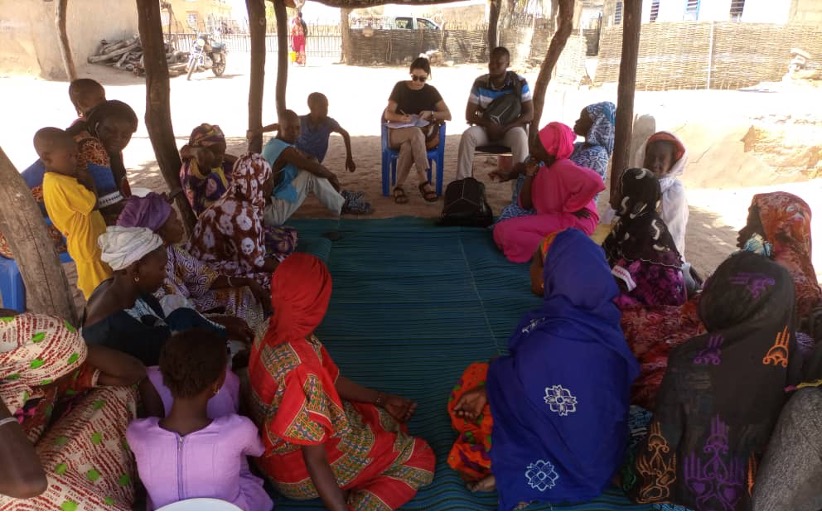Above: A Debbo Galle Group during a focus group discussion with Leland Fellow Natalie Petrulla (seated, in blue chair) and Debbo Galle Coordinator, Marcel Yanga, in the northern region of Saint Louis, Senegal.
It is important to note that LGBTQI+ rights are restricted in Senegal. All project participants self-identified as male or female and were in heterosexual couples. Therefore, the discussion of “women’s empowerment” in this blog is limited to gender binary/heterosexual couples.
To a development practitioner, working with women to achieve food security and nutrition outcomes is a no-brainer. In many parts of the world women are responsible for all childcare and cooking, so logically to improve household nutrition, women should be included. While there are many ways to improve household nutrition, working with women should always be at the center. For example, many projects provide nutrition education to improve food usage, horticultural training to increase availability, working to increase access through Village Savings and Loans Associations (VSLAs), or a combination of these activities.
On the surface, when a project addresses availability, access, and usage of nutritious foods, there is the intention for it to empower women to improve their household’s food security and nutrition, and therefore create a recipe for success. However, this recipe needs a secret ingredient: agency.
What happens when only women are provided training on the importance of nutrition, but have no power over what ingredients to purchase? What happens when women cook a higher percentage of animal sourced foods and vegetables, but are not allowed to consume them because in their culture these foods go to men and elders? Or what happens when a woman is trained on how to plant fruits and vegetables but does not or cannot own land to start a garden? The answer is not always improved household food security and nutrition.

Selection of agricultural products grown by a Debbo Galle Group in the Central region of Fatick.
In my first year as a Mickey Leland International Hunger Fellow, I had the opportunity to explore some of these questions through the USAID Feed the Future Kawolor Project. Kawolor is a Nutrition-Led Agriculture project that takes a holistic approach working with communities to increase production, consumption, and commercialization of safe and nutritious foods. Women are at the center of this approach. Kawolor formed “mother leader” groups called “Debbo Galle Groups,” in the indigenous language, Pular, where women came together to form VSLAs and receive training on the production and consumption of nutritious foods. Beyond technical training and simply including women in project activities, Kawolor also implemented activities focused on increasing women’s empowerment and agency in many communities. Firstly, Kawolor implemented Nurturing Connections, which worked with couples to increase communication and start conversations about gender and social norms. Secondly, Kawolor used a male gender champions strategy in which prominent men in the community were selected and trained on gender topics so they could act as role models and address gender and social norms in the community. These activities were crucial in addressing many of the cultural and social barriers women face that prevent them from applying technical trainings.
While working with Kawolor in its last year of implementation in collaboration with local project staff, I implemented a qualitative study on the impacts of the project on women’s empowerment and the relation to the project’s food security and nutrition outcomes. We held a total of 40 focus group discussions with representatives of 94 Debbo Galle Groups across five regions of Senegal. I asked women about the challenges and enabling factors that influence their ability to increase their agency and apply trainings on food security and nutrition topics. The final study report will be available in early 2023, but key themes on women’s empowerment emerged in the analysis.
Across all discussions one theme was clear: addressing women’s agency and empowerment was critical to achieving the project’s food security and nutrition goals. In communities where male gender champions and/or Nurturing Connections were implemented, women cited increased participation in decisions over income and division of nutritious foods within the household. This is because these types of activities engaged men and addressed the gender and social norms that were the root causes for women’s inability to make effective change and apply technical trainings on food security and nutrition.
Ultimately, integrating these activities not only empowered women, but also made it easier to participate in Kawolor trainings on food security and nutrition topics, as well as apply those trainings. Women had an easier time getting permission from their husbands to leave the home and attend meetings with Kawolor staff and start home gardens for fruit and vegetable production. These activities also encouraged men to play a larger role in household tasks, leaving more time for women to participate in trainings, VSLAs, develop their own gardening or income-generating activities, or for leisure.
This study creates a strong case for going beyond simply including women in training or targeting them for nutrition activities. It demonstrates that addressing the gender and social norms in a community alongside food availability, usage, and access is crucial for achieving desired project results in food security and nutrition. Ultimately, development practitioners need to think of gender as not just a required criterion to fill a target number of women to reach, but as a crucial piece to address within communities and households to ensure sustainable impacts on food security and nutrition.

